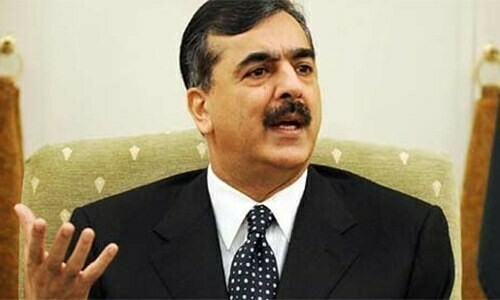ISLAMABAD: The Islamabad High Court (IHC) on Monday reserved judgement on PTI Chairman Imran Khan’s pleas for post-arrest bail and the cancellation of an FIR registered against him in the cipher case.
Separately, the court also disposed of Mr Khan’s plea against a jail trial in the cipher case.
IHC Chief Justice Aamer Farooq observed that since the ex-premier’s legal team had consistently expressed concerns over his security during court appearances, prima facie, the decision for his trial inside the prison “was not malafide”, as pleaded by Mr Khan.
The IHC CJ, however, asked Mr Khan to approach the trial court concerned for redressal of his grievances.
IHC CJ Farooq ‘disposes of’ petition against jail trial; PTI chief’s lawyer claims taxpayers’ money being used to suppress their party
The court reserved the verdict after the prosecution, and Mr Khan’s lawyers concluded their arguments on both petitions.
The counsel for Mr Khan, Sardar Latif Khosa, said an FIR could not be registered against his client since the federal cabinet of former prime minister Imran Khan has already declassified the cipher.
He claimed Mr Khan enjoyed immunity as provided in Article 248 of the Constitution that protects the president, governor, prime minister, federal minister, minister of state, chief minister and provincial minister for their “act done or purported to be done.”
Article 248(1) states that the officials mentioned above “shall not be answerable to any court for the exercise of powers and performance of functions of their respective offices or for any act done or purported to be done in the exercise of those powers and performance of those functions”.
Earlier, another counsel for Mr Khan, Barrister Salman Safdar, argued that Section 5 of the Official Secrets Act was not applicable in the cipher case.
He said that the section could be invoked for sharing sensitive information with foreigners, and this “main ingredient is missing” in the FIR against Mr Khan.
The act focuses on armed forces and could be invoked for sharing information with the enemy state, according to Mr Safdar, who argued that military courts tried suspects booked under this law in the past.
“This is the first time in the history of Pakistan that an ex-prime minister and foreign minister are being tried under this act.”
The prosecution unnecessarily dragged Mr Khan and Shah Mehmood Qureshi into the case by expanding the scope of the law, argued Mr Sadfar.
When Mr Safdar said the relevant ministry — in the case of cipher — was foreign affairs, but the interior secretary lodged the FIR, the special prosecutor replied that the federal government authorised the official to file the complaint.
Raja Rizwan Abbasi argued the FIR could not be quashed as Mr Khan has admitted the alleged crime and never denied the allegations of sharing sensitive information with unauthorised persons.
The cipher was entrusted to him in confidence by virtue of his office, and the former PM “wrongfully communicated the contents for vested interest”.
The prosecutor went on to state that Pakistan’s then-ambassador to the US, Asad Majeed, sent a cipher, and the foreign affairs secretary declared it classified.
In response to Mr Khosa’s argument that the cabinet had already declassified the document, the prosecutor informed the court that “there is nothing on record” about the declassification of the secret document.
Only the authority which declared the document “classified” was authorised to declassify it.
Explaining the chain of events, Mr Abbasi said the cipher assistant at the Ministry of Foreign Affairs, decoded the document.
He sent it to deputy director Imran Sajid, from where it was forwarded to another deputy secretary, Haseeb Bin Aziz, for onward submission to the then-foreign secretary Sohail Mehmood.
Mr Mehmood forwarded copies of the cipher to the PM, foreign minister, chief of army staff and ISI DG after assigning it a unique code.
The cipher officer in the PM Office, Shamoon Qaiser, received the document from the ministry and sent it to deputy secretary Haseeb Gohar.
After passing through the desk of another deputy secretary, it finally landed in the office of the then-principal secretary to PM Azam Khan, the prosecutor claimed.
Mr Azam had already testified before an investigation team and dispelled the impression that the statement was recorded under duress.
Regarding immunity under Article 248 for Mr Khan, as claimed by his lawyers, the prosecutor argued that “there is not a single word about immunity in criminal proceedings”.
Only presidents and governors are exempted from court proceedings while in office.
Efforts to ‘crush PTI’
Separately on Monday, PTI core committee member Shoaib Shaheen claimed state institutions were using taxpayers’ money to crush PTI, the most popular party in Pakistan.
Speaking at a press conference at the National Press Club, Advocate Shaheen said during the last 16 months, the country faced the worst financial losses.
“The caretaker government has been misleading the masses by saying it was equally dealing with all political parties.”
He also criticised former prime minister Nawaz Sharif and said he was hoping to become prime minister for the fourth time.
“But the nation has rejected him and his narrative.”
Mr Shaheen also criticised the trend of picking former PTI leaders and forcing them to hold press conferences to denounce Mr Khan’s party.
Without mentioning the name of Farrukh Habib, who joined the Istehkam-i-Pakistan Party (IPP) on the same day, the lawyer said people were being forced to join IPP and warned that it would lead to more unrest and worsen political crisis and divisions in the country.
Replying to a question, Mr Shaheen said people were being kidnapped and coerced to make statements against PTI.
“These persons can be forced to say they have joined the Bharatiya Janata Party,” he quipped. Meanwhile, a statement issued by the PTI core committee stated that after the Toshakhana case, Mr Khan was being made an example in the cipher case.
Published in Dawn, October 17th, 2023













































Dear visitor, the comments section is undergoing an overhaul and will return soon.